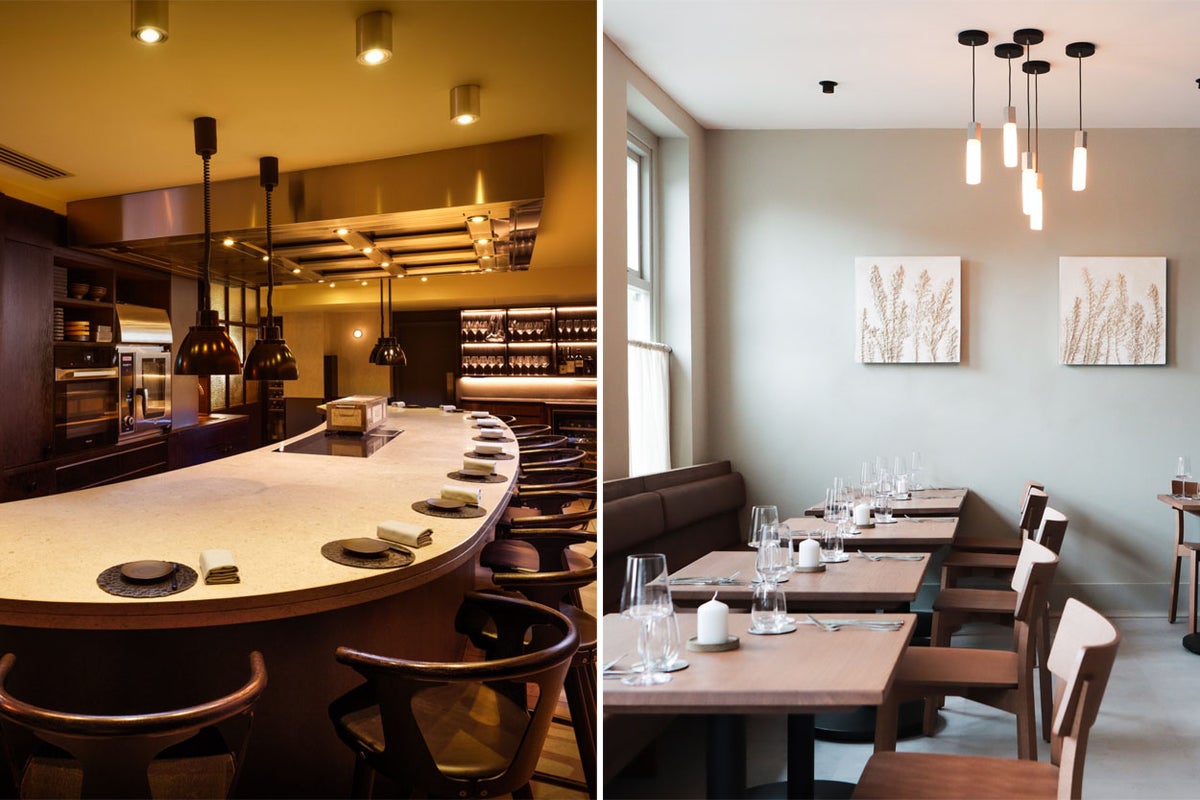
I started this column with one question: when is it really worth it? Restaurants have never been shy about separating you from your money, and lately it feels like they’d charge for air if they could get away with it. Some meals, though, make you glad you handed over your card at the end. So I try them for you – the splashy openings, the whisper-quiet gems, the big-ego tasting menus and the surprise bargains – and report back so you can decide if your wallet (and your patience) can take it.
This time, I did the unthinkable: I left London. Not that you’d know it from the evidence. The martini still arrived before anything else, the bump of roe was suspiciously large and I’m fairly sure someone was paid to whisper “foraged” every fifteen minutes just to keep the Londoners calm. Some habits die hard.
But the comparison was too tempting to resist. Two restaurants. Two chefs with big ideas about what “local” should taste like. Both with one Michelin star pinned to their chests – but worlds apart in attitude, setting and cost. Aulis is a trick door to Cumbria hidden behind a nondescript Soho side street: the city version of Simon Rogan’s Lake District empire, where everything is farm-first and the plates make you dream of damp hedgerows and soft sheep’s wool.
Gorse, meanwhile, sits on a sleepy corner in Cardiff’s Pontcanna, in what used to be a coffee shop – and, frankly, still looks like it might do an oat milk flat white if you asked nicely. Chef Tom Waters earned the capital’s first ever Michelin star here, but there’s no mood lighting, no moodiness, no fuss. There’s just 22 seats, a team in Birkenstocks and a menu that reads like a sightseeing bus tour turned poetry recital: salt marsh lamb, Pembrokeshire crab, seaweed stock in your martini.
One will cost you nearly £500 if you lean into the wine list (and you will, because you’re only human). The other can be yours for £60 if you turn up at lunch and behave yourself. Both, in their own ways, make a compelling case for what “fine dining” can be when it means something more than just fireworks and fillet steak. Sometimes you don’t need bells and whistles – just a table, an idea and enough trust in the kitchen to let you taste the place for what it is.
Aulis, London: Cumbria on the plate, Soho on the bill, but worth every penny
Farm-first, fuss-free and so good you’ll forgive the bill – proof there’s still magic to be found in the capital’s big-money tasting menus.
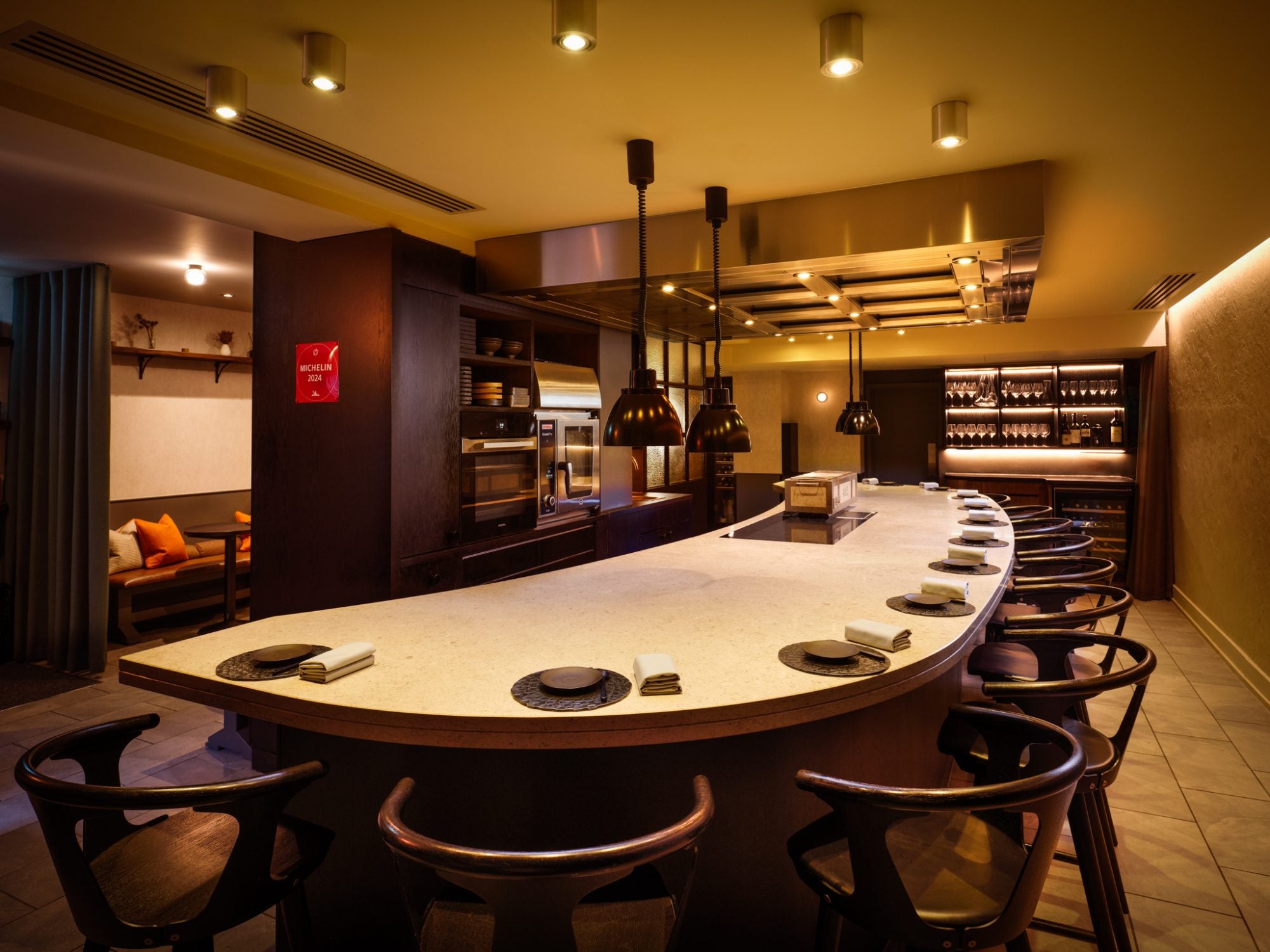
Aulis London is the culinary equivalent of a trick door in a fantasy novel – you slip down a side street in Soho and suddenly find yourself somewhere else entirely: Cartmel, perhaps, or a damp hedgerow in Cumbria. You’re still in Zone 1, but the air feels cleaner. The food certainly does.
That’s the whole point. Aulis is Simon Rogan’s chef’s table, a 12-seat offshoot of his Lake District HQ, where everything – the milk, the trout, the chlorophyll-sticky herbs – comes from “Our Farm” up north. Provenance is the headline here. And if you spend any time in restaurants, you’ll know that telling diners where their food comes from has become both obligatory and exhausting. Peas plucked at dawn. Lamb that did pilates. Trout with an origin story. It’s enough to make you root for margarine.
Aulis, London
Good to know
Chef: Charlie Tayler (under Simon Rogan’s watchful eye)
Seats: 12 at the counter, all chef’s table, all tasting menu
Tasting menu: 10-ish courses, £195pp (wine pairings from £95 to a gulp-inducing £295)
Drinks: Pairing, bottle or just water if you’re feeling rebellious
Dress code: No stated rules – smart-ish won’t hurt, but you’ll be facing the chefs, not a runway
Vibe: Intimate, quietly serious, more about the farm than the flash
Best time to go: Dinner – get the full trick-door-to-Cumbria effect
And yet, somehow, Aulis gets away with it. Maybe because Rogan more or less invented the genre – farm-first cooking as doctrine rather than decoration. It’s as much part of his personality as marathons are to the over-30s. Maybe because when your plate is this dialled in, you want to know about Trevor who grew the carrots. Or maybe because the food is just… joyous.
Canapés arrive first and, to be honest, could be the whole meal. One-bite marvels that prove restraint doesn’t have to mean minimalism. Someone should open a restaurant with a one-bite tasting menu. Call it Nibble. Get a Michelin star. Retire.
A tartlet of Chalk Stream trout with a sashimi-style sliver of its own flesh – both elegant, one rich and precise, the other cool and clean. A “truffle pudding” that’s mille-feuille by way of Greggs: buttery, starchy, savoury, layered and laced with truffle, not like a luxury tax but an aromatic thread.
Galloway beef tartare, no sludge or theatrics, tucked into crisp little shot-sized shells. It’s tartare without the usual drag: no egg yolk sludge, no chilli bravado. A chickpea wafer, topped with peas, kombu and fresh curds, is almost absurd in its economy. A square inch of cracker, yet somehow it contains spring, salt, sea and cream in a single snap.
I could’ve stopped there and been thrilled. But this is Aulis, and there are more riffs to play. A scallop, formed into a firm little puck, sits in a pool of buttermilk, with roe that pops like savoury boba. A slab of hispi cabbage is charred and dressed with the kind of intensity usually reserved for ribeye, all smoke and crunch and savoury swagger.
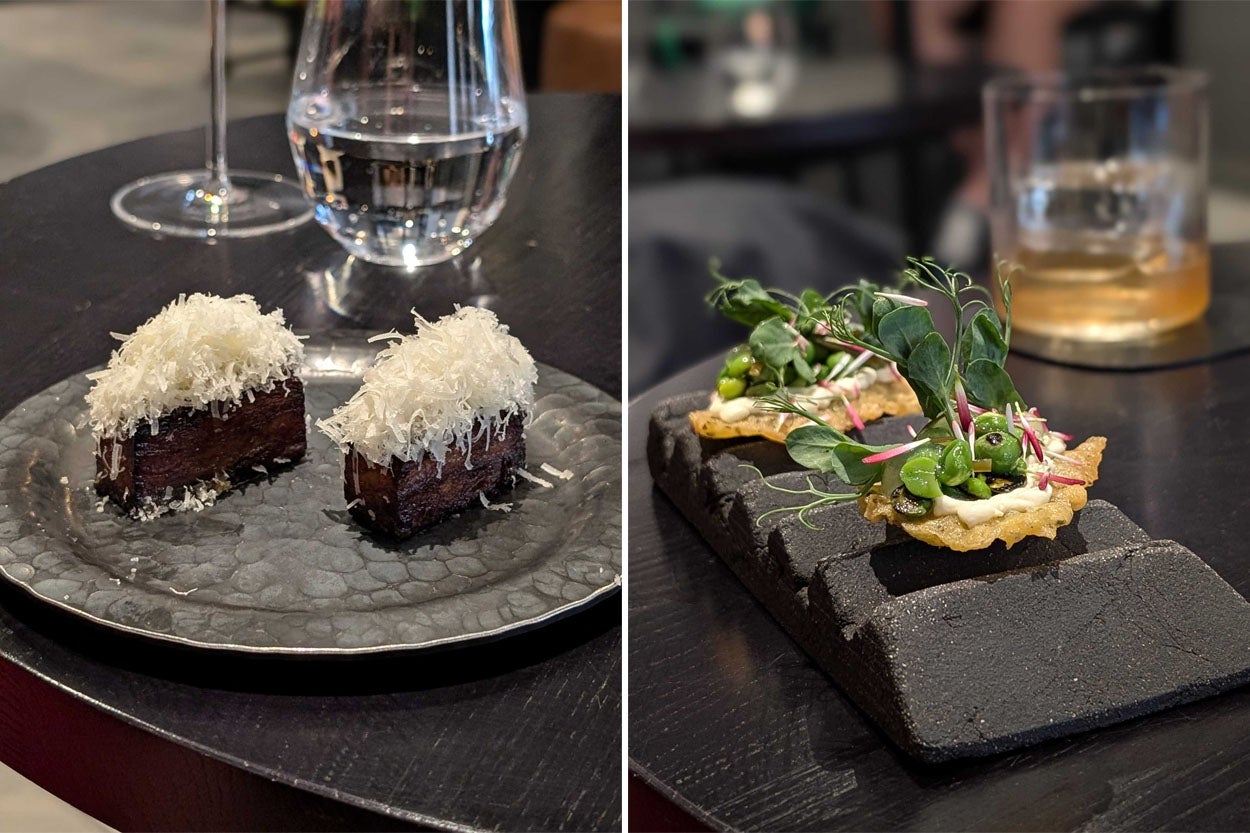
Turbot gets the Michelin-starred treatment, which is to say, it’s poached and then politely drowned in smoked roe cream alongside asparagus. Do chefs believe there’s an asparagus quota that must be filled before the season ends in June? I’m certain I’ve eaten an entire field of the stuff in the last week. No one – not even Rogan – can convince me we need this much of it.
There’s also lamb: just a single, blushing fillet, not the usual intimidating trio of loin, belly, confit shoulder or whatever other sacrificial offering is trendy this week, finished with fig leaf vinegar and wet garlic. No flourishes, no drama. Just food that remembers what it’s for.
The beetroot – salt-baked, pink and purple and blackened – looks like a painter’s palette once scraped clean, with blackberries and smoked eel swirled like oil paint. I stared at the bowl longer than I care to admit. If I had wall space, I’d hang it.
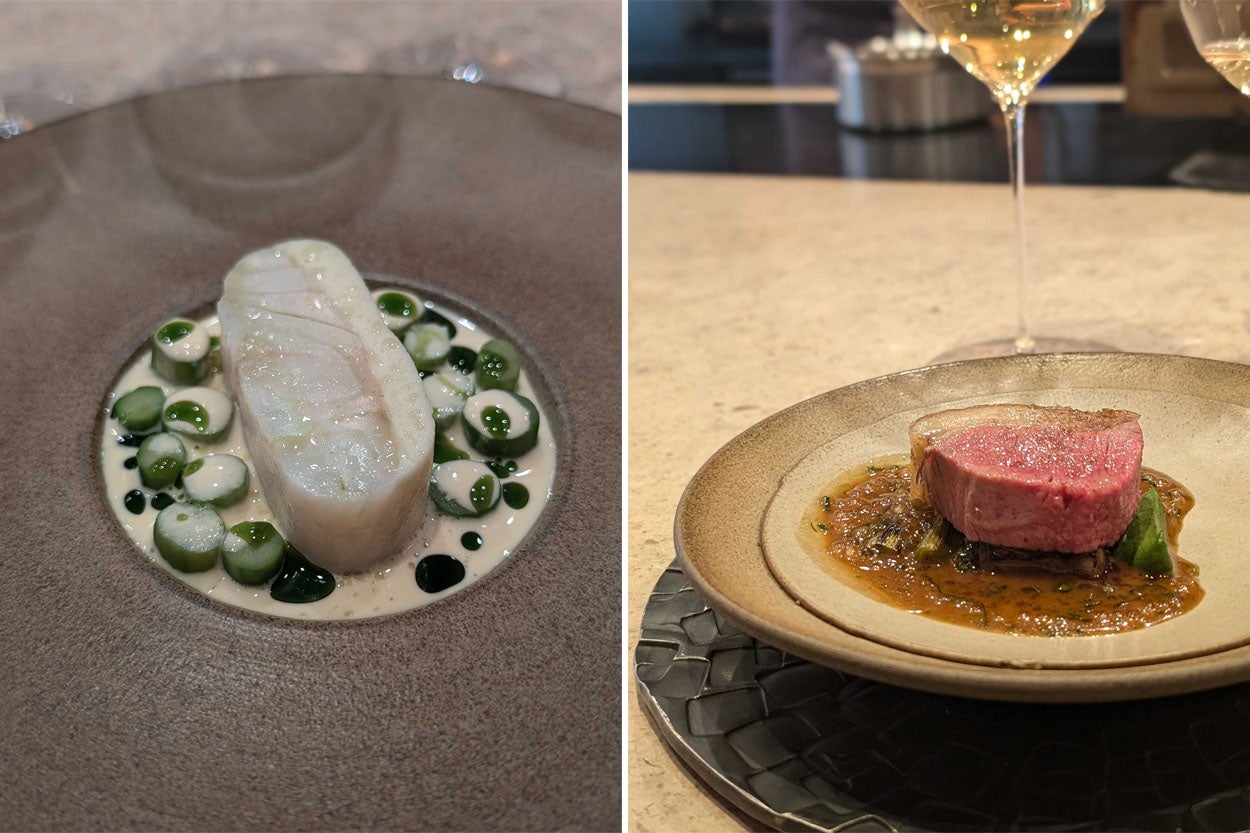
Dessert is usually when I start looking for an Uber, but the frozen Tunworth cheese, a L’Enclume classic that has not so much haunted me since I first tried it as gently followed me home, returns here with cobnuts and spelt grains. Clever, confident. Like Rogan is saying: “I know you think you don’t want cheese ice cream, but trust me.” And I do. Just not with asparagus.
All of which makes the price feel… tolerable, somehow. Not cheap, obviously – nothing in this genre is. You’ll part with £195 before drinks, or closer to £500 per person if you succumb to the full-whack wine pairing (yes, you can just order a bottle, or tap water, like a normal person).
It’s getting harder to recommend restaurants at this level with a straight face. Countless tasting menus in London hover around this price – most with the same farm-to-somewhere shtick, some with more fuss, others with bigger names – but few feel quite so worth it.
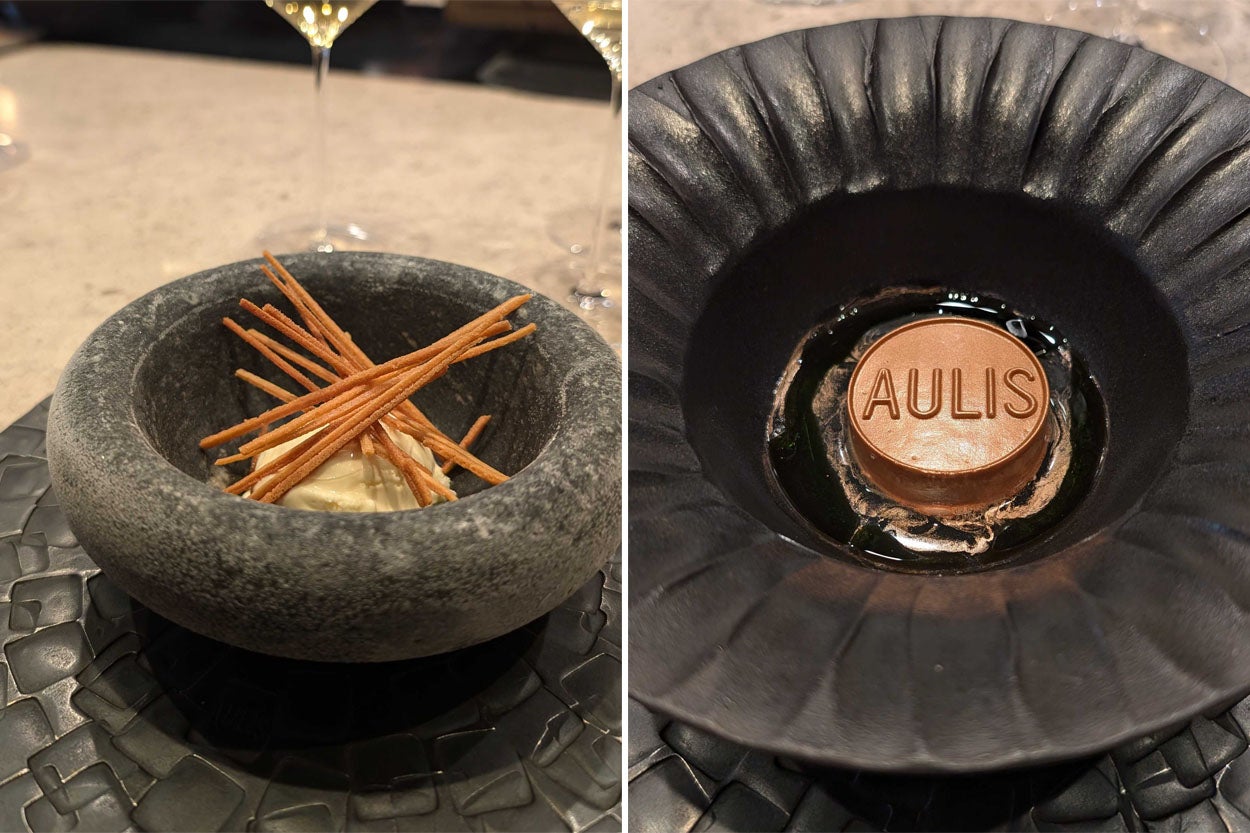
I can’t fully explain why Aulis still does. Maybe it’s nostalgia; I peeked behind the curtain in Cartmel once, saw the farm, listened to the staff talk about turnips with the fervour of newly minted cult members and let myself be indoctrinated. Maybe it’s because Rogan’s flavour logic has never strayed into ego or gimmick. Maybe it’s because, unlike so many other fine-dining flagships and spin-offs, there are no near-misses here. Every mouthful feels like it has a point to make.
There are tasting menus you book because you want to say you’ve eaten the chef’s name (Ducasse, Ramsay, Smyth). There are ones you go to to mark an occasion, or because your mum heard it was nice on TripAdvisor. And then there’s Aulis – which is the tasting menu as show home for what this style of eating should be. It’s as much about the cooking as it is the concept; a meal first, a flex second. It doesn’t try to reinvent the wheel. It just smooths it out, oils it and rolls you somewhere quieter.
It’s expensive, yes. It’s a bit wishy-washy in places, sure. But somehow they never make you feel like you’re paying to be dazzled. You’re just paying for good food, handled with care, which, in this city, is rarer than it should be.
I still long for L’Enclume – the original, the farm, the whole damp Cumbrian dream of it – but Aulis London gets me most of the way there without leaving Zone 1. Which is, really, the magic of the place: that trick door at the edge of Soho that, for three hours or so, whisks you somewhere with softer edges and more hedgerows – then deposits you gently back on St Anne’s Court, blinking at the noise, wondering if you dreamt it.
16 St Anne's Ct, London, W1F 0BF
Open: Tuesday to Saturday for dinner from 7pm, Friday and Saturday lunch from 12.30pm. The experience usually takes around three and a half hours.
Price: Tasting menu £195, wine pairings from £95 to £295, non-alcoholic pairing £79 (wines by the bottle available)
Bookings released on the first Tuesday of each month for two months in advance.
www.aulis.co.uk/aulis-london | 020 3948 9665 | aulislondon@simonrogan.co.uk
Gorse: The tiny Cardiff star showing Wales was always more punk rock than pastoral
No techno, no tweezers, no £400 bill – just Welsh soul, smart cooking and a bill that won’t make you weep.
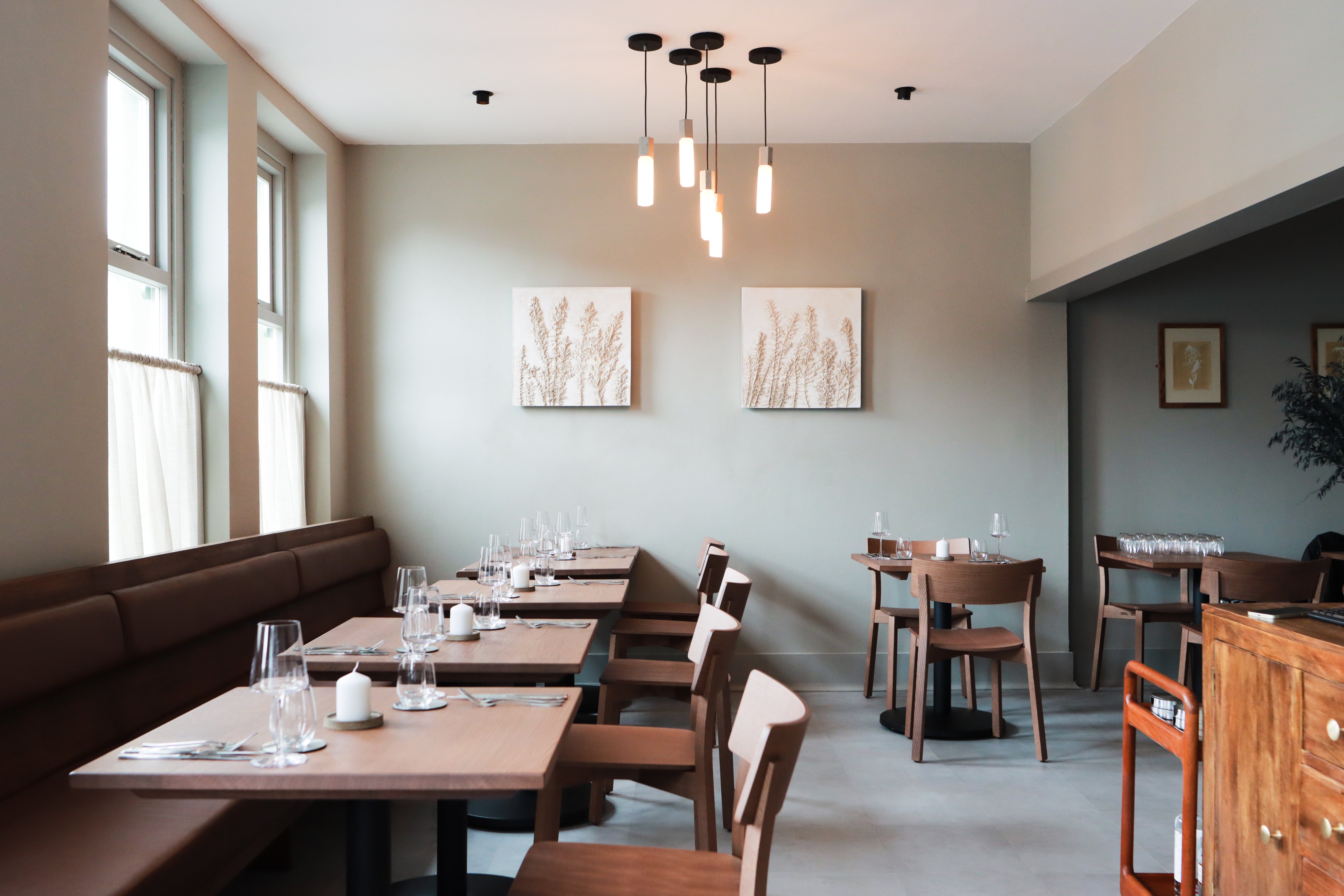
Meanwhile, over in Cardiff, a restaurant is doing the opposite – not transporting you somewhere else, but insisting you stay right where you are. Well, after a three-hour train and a brisk walk, obviously.
Gorse, with chef Tom Waters at the helm, sits on a quiet corner in Pontcanna, in what used to be a coffee shop (and actually what still looks like a coffee shop). It’s now home to the city’s first-ever Michelin star, earned less than a year after opening. That fact alone should be enough to tell you how overdue this is. Wales has always had the good stuff, like the country’s larder everyone borrows from but rarely celebrates properly until there’s a feast to impress the neighbours. Salt marsh lamb, crab plucked from Pembrokeshire, seaweed thick on the tide. A national bounty hidden in plain sight.
Gorse, Cardiff
Good to know
Chef: Tom Waters
Seats: 22, all within whiffing distance of the kitchen
Tasting menu: Four courses for £60 (lunch only), seven for £95, 10 for £125 – a steal
Drinks: Wine pairings available; start with the martini, thank us later
Dress code: They won’t judge your jeans, promise – just maybe not your rugby kit
Vibe: Warm, calm, no fuss – more ballet than banger
Best time to go: Friday or Saturday for the longer menu – linger, then roll to the pub next door
Still, there’s no fanfare at Gorse. Just 22 seats, a small team in Birkenstock clogs who move with the calm efficiency of a ballet company, and a menu that doesn’t so much perform as it does reflect. If Ynyshir is Welsh dining on a nightclub bender – techno, tweezers, £390 price tag – then Gorse is the morning after. Not in a bacon sandwich and Berocca kind of way, but in the sense of clarity that comes when the noise fades. Waters takes the raw materials of Welsh cooking – mutton, seaweed, oats – and does what Rogan does for Cumbria at Aulis: refines them, sharpens them, lets them speak for themselves. Transformed not beyond recognition, but into something cleaner and quietly sure of itself.
If you’re looking for theatre, you won’t find it here. What you will find is an excellent martini that gives the capital a run for its money. Gorse’s house version has been on since day one, a gentle wink that they knew exactly how to coax in Londoners, even this far west of Paddington. It’s made with seaweed stock, Dà Mhìle gin and local vermouth, and it’s as saline and elegant as the coastline it conjures. A coastal dirty martini, if you will, but one that washes your sins away instead of compounding them.
The first thing you eat, or rather the second thing you drink, is a seaweed broth – the kind influencers try to sell you as a miracle detox elixir, only this one isn’t part of a green juice pyramid scheme. It’s briny, mushroomy and served in a handmade mug that looks like it’s been prized off a rock pool. Welsh seaweed, and indeed the Welsh coast, is a lot like the Japanese, just treated differently. They dry theirs into nori sheets. The Welsh boil theirs for 10 hours and turn it into a thick black sludge called laverbread. Because here in the British Isles, we like to cook things until they forget what they used to be. And yet, this one is delicious. Not quite Tokyo, not quite Tenby, but a compelling case for the in between. Maybe I’ll start flogging it myself.
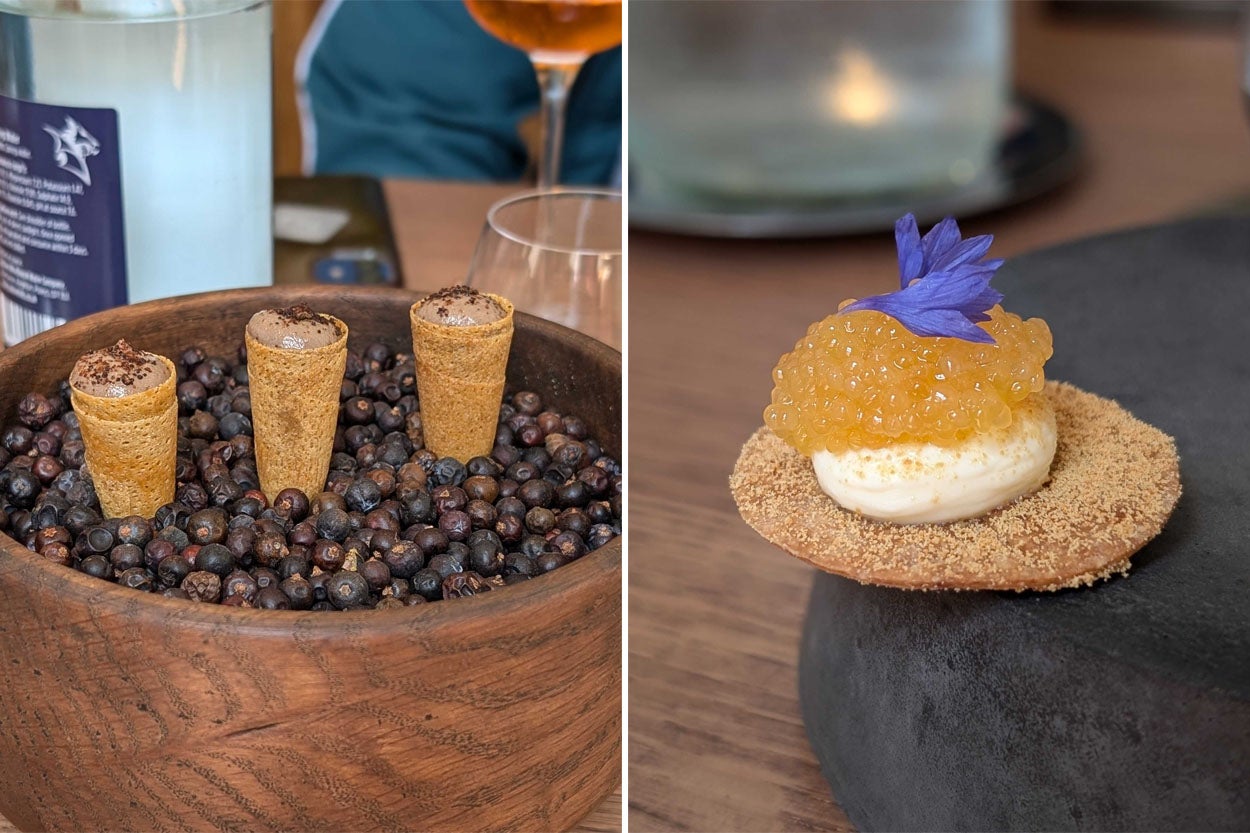
And so it goes. The meal builds like a memory. A disc of celeriac in a slick of buttermilk-laverbread sauce does its best impression of that scallop dish you’ve clocked a hundred times on other tasting menus but is entirely of itself: earthy, saline, oddly nostalgic. There’s crab from Solva, pureed with horseradish into a smooth, orby blob somewhere between quenelle and custard, topped with a bump of roe so generous it might start a rumour in Soho. Between that and the martini, it feels just like home.
It’s a menu that starts like a sightseeing bus tour (but with better snacks) and ends like a whispered folk story – Waters uses Welsh ingredients the way a poet uses dialect: familiar but reborn in your mouth. There’s Pembrokeshire mackerel under another slap of horseradish, apple and lovage giving bite and brightness. Mutton from the Gower arrives robust and just a little feral, with wild garlic and a neat fillet of neck on the side – no nonsense, just the good stuff.
But for all his respectful nods to the land, Waters isn’t shy about bending its rules. A mushroom and pickled juniper cone – basically a miniature forest disguised as a Cornetto – lands in one bite: earthy, creamy and weird in all the best ways. Mushroom ice cream is surely just one plucky investor away. I’d buy the six-pack.
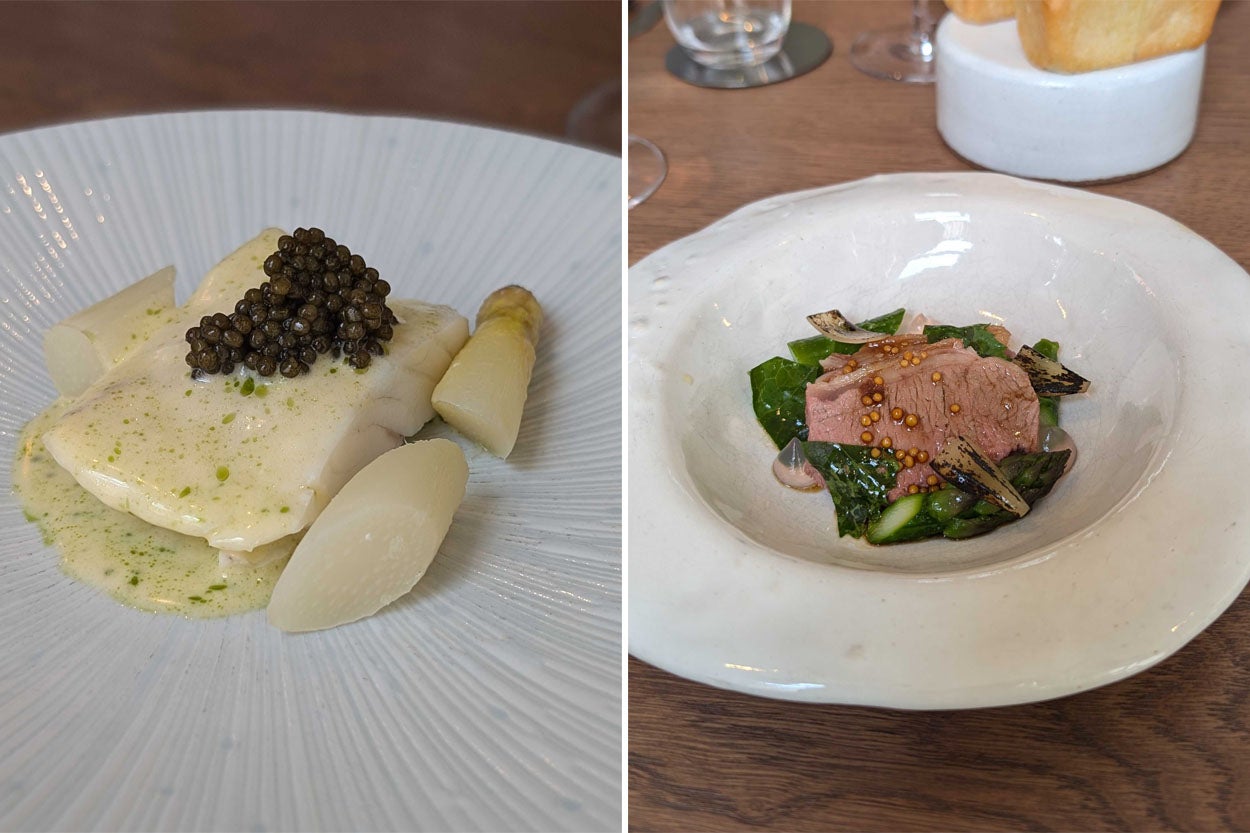
Dessert, once again, does the heavy lifting. This time it’s sucan – or llymru, or flummery, depending on how deep you want to dig into Welsh culinary trivia. Once a humble, tangy oat pudding for labourers, now a slick, silken finale with apple caramel and smoked raspberry jam, all subtle sourness and deep comfort. It’d look perfectly at home behind a polished glass counter in a Parisian patisserie, but feels truer here, on a quiet Cardiff corner, exactly where it belongs. It’s not the kind of pudding you expect from a Michelin-starred kitchen, but then again, that’s sort of the point.
The wines follow the same rhythm – unfussy, quietly interesting but well worth paying attention to. A glass of Grüner Veltliner from Loimer starts things off with just the right amount of zip: crisp, citrusy, faintly peppery, like it’s been designed to wake up your palate without elbowing the food out of the way. The “Ava Marie” Chardonnay from Restless River comes in later – cool, elegant, lightly oaked, with that chalky sort of backbone that makes mackerel taste even more like mackerel. And with the mutton, a natural Anjou Rouge from Domaine des Brumes, all juicy red and gentle grip, with enough dirt under its nails to meet the wild garlic head-on but still feel light on its feet.
There’s a four-course lunch at Gorse for £60. The seven-course is £95. Go all in with 10 at £125 and you’re still, somehow, paying less than at most London restaurants trying to sell you a story half as well told. Because that’s what Gorse does so elegantly: it roots you in Wales not with fanfare or flag-waving, but through the slow build of ingredients, rhythms, rituals. You come expecting polite heritage. You leave realising Wales was always more punk rock than pastoral.
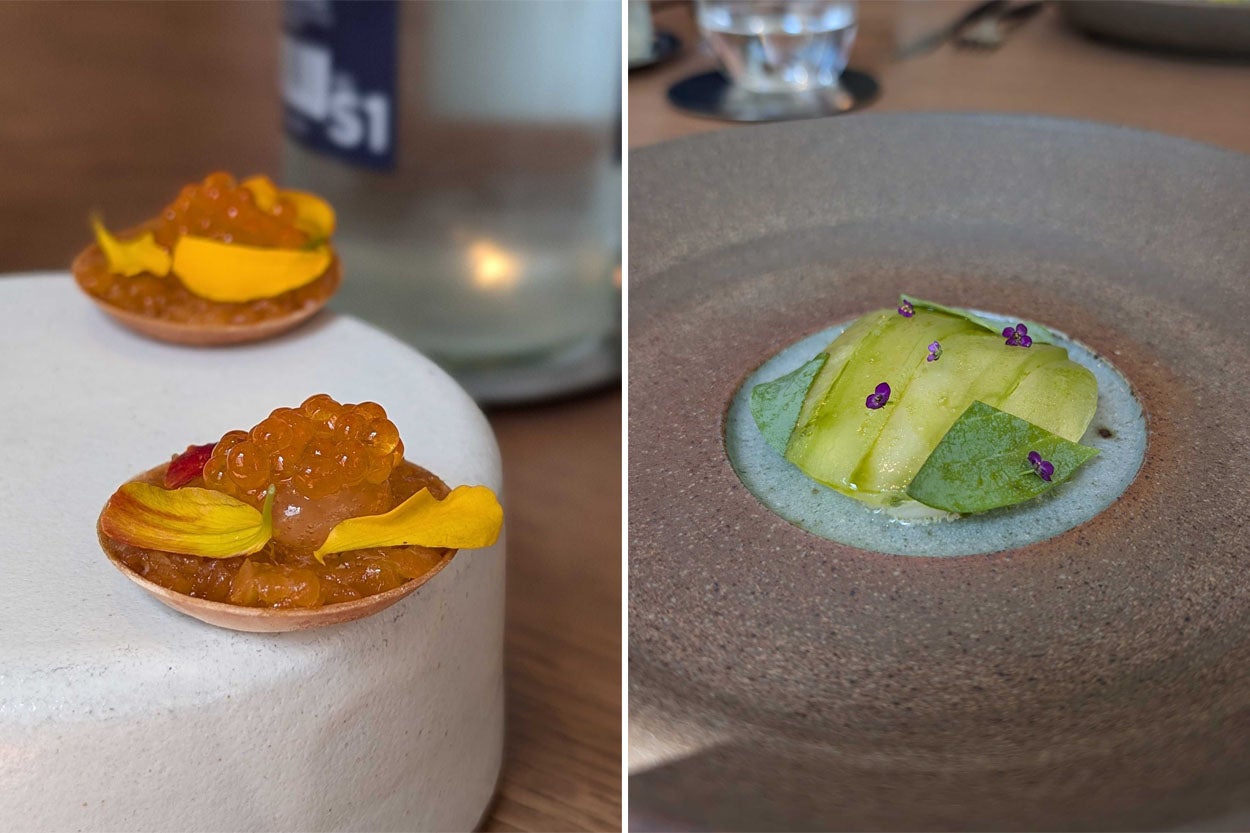
If Aulis is the tasting menu as magic trick, a rabbit pulled from a Cumbrian hat in central London, then Gorse is the tasting menu as map. Not the shouty kind with arrows and landmarks, but the sort you fold into your pocket and keep, just in case. One experience is imported, the other is homegrown. One bends place to the plate; the other lets place speak for itself.
And that, perhaps, is the joy of this column: not just finding where the food is good – and, crucially, where it’s worth the price tag – but where it means something. Sometimes it’s a sleek Soho counter conjuring the Lake District in 10 courses. Other times it’s a former coffee shop in Cardiff, whispering stories of seaweed, oats and salt marsh lamb. Different destinations, same principle. And dining, when done right, doesn’t need to travel far to take you somewhere.
186-188 Kings Rd, Cardiff, CF11 9DF
Open: Tuesday to Thursday 18.30-20.00, Friday and Saturday 12.00-14.00 and 18.30-20.00
Price: Four courses £60 (lunch only), seven courses £95, 10 courses £125. Wine pairing or list available
Booking essential
www.gorserestaurant.co.uk | 02920 372055 | hello@gorserestaurant.co.uk







